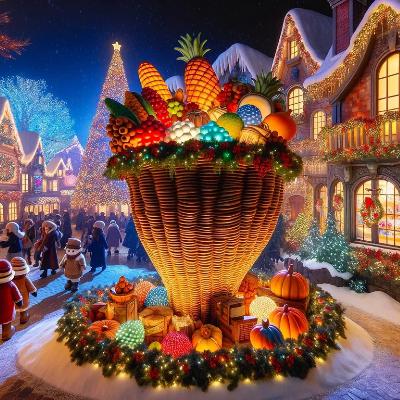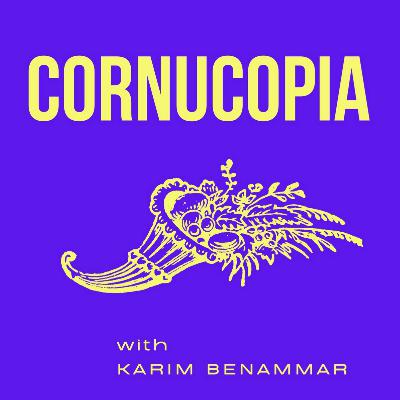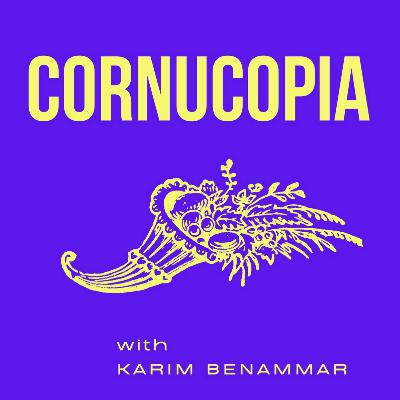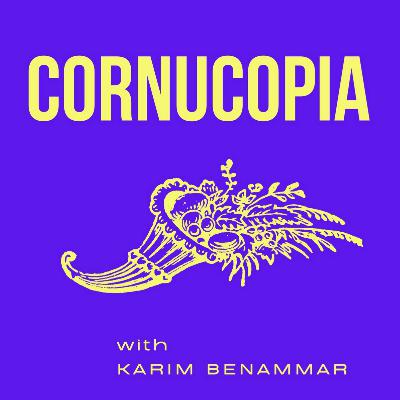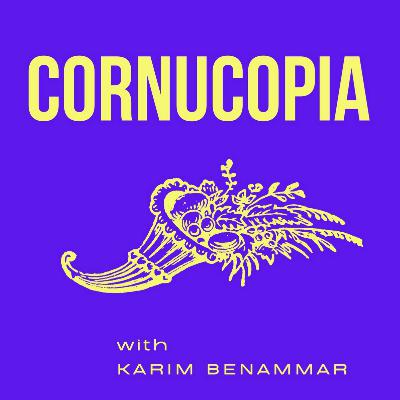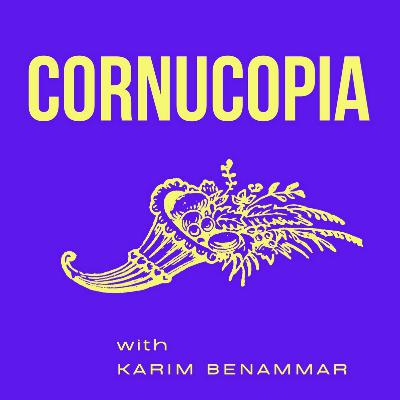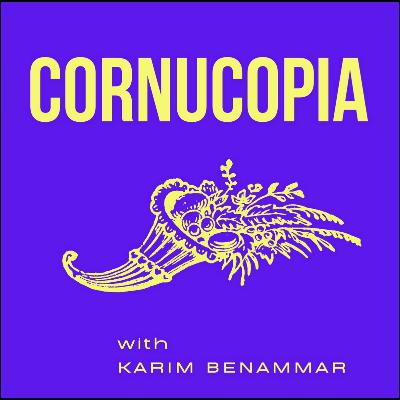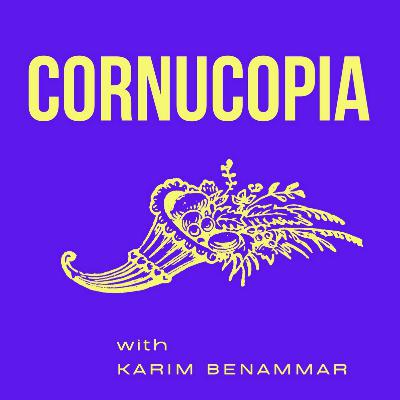Discover Cornucopia
Cornucopia

Cornucopia
Author: Karim Benammar
Subscribed: 1Played: 229Subscribe
Share
© 2023 Cornucopia
Description
How do we live abundantly? Philosopher Karim Benammar explores the shift from a world of scarcity to a world of abundance. From a world of lack to a world of plenty, from surviving to living, and from struggle to possibility and freedom. Each episode, recorded on a walk, explores a concept in economics, ecology, psychology or philosophy.
19 Episodes
Reverse
A parable in the Cornucopian spirit for Christmas
In a world of scarcity, our work and organisations are focused first on surviving, and then on producing enough for a safe and comfortable life. As we are shifting to a world of abundance, doing work which is meaningful to us, and working for organisations with a purpose, becomes much more important. As we become aware of our power to shape the world, we can decide to consciously create the future we want for humanity.
The philosopher Albert Camus uses the myth of Sisyphus as a parable for human existence. We are condemned to toil endlessly, without result, like Sisyphus pushing a boulder up the hill, only to have it roll down again. This is certainly the case in a world without progress, in which we are barely surviving, but is it true in a world of abundance and creativity? Can humanity escape Sisyphus’ fate? If so, what does that future look like? Let’s revisit this myth and the fundamental question about of the meaning of our lives.
The outside world overflows our senses: we continuously see, hear, smell, taste and feel. Our mind overflows with thoughts and memories: there is constant chatter in our heads. The world is full of possibility. We continuously filter this overflow, by shifting our gaze, by picking up sounds, by noticing things, and by making choices. As we are shifting from survival to living, the meaning of our lives also changes. How do we find meaning in a world which is not empty, but overflowing?
Generosity - a virtue many of us aspire to - is not just about giving money away, or sharing tangible things. It is also generosity of spirit, magnanimity: being genuinely happy for other people's successes and fortune, rather than jealous or resentful. If we make a mental shift to abundance, if we realise we live in a world of plenty, we are no longer in endless competition, and generosity of spirit comes naturally. The same effect occurs with financial generosity. Realising we live in an abundant world makes us naturally generous.
The shift to abundance has led to an abundance of objects, of creative content, but also of possibilities and of choices. If we apply our traditional strategies when choosing, such as trial-and-error, we will be overwhelmed. We become paralysed, incapable making a choice, or fearful of missing out on a better option. In this episode we explore new strategies to enjoy an abundance of choice, and to reframe the Fear of Missing Out (FOMO) into the Joy Of Missing Out (JOMO).
Nothing illustrates the shift to abundance as powerfully as the enormous rise in creative content - music, books, videos, films, TV series - that have become available to all of us with the advent of the Internet and the smartphone. This overflow of material is both wonderful and overwhelming. And we are on the cusp of a new wave, of a veritable tsunami of software-generated material, with the advent of AI programs like Chat GPT. What new strategies can we develop to enjoy this overflow of material, instead of drowning in it?
Nuclear weapons, greenhouse gases, plastic soups, forever chemicals, genetically modified food, viruses and animals, artificial intelligence: since the dawn of civilisation, technology has been both a blessing and a curse. The parable of the Sorcerer's apprentice, who unleashes forces he cannot control, is thus a cautionary tale. But it is also a tale of apprenticeship, of curiosity and ambition, of learning by making - and correcting - mistakes. As we shape the future of humanity and our planet through technology and policies, doing many things for the first time, we are all apprentices.
Nature is not scarce, but it can be destroyed. Our greatest problem is therefore not scarcity, but our wanton destruction. Ancient wisdom, in the form of the parable of the goose with the golden eggs, illustrates this wonderfully: the abundant growth of the natural world - the golden eggs - and the vulnerability of natural ecosystems (the goose). We unpack the layers and lessons of this teaching tale to inspire our shift to abundance.
Climate Positivity is a way to approach our current climate crisis from an abundance mindset. The challenge we are facing is enormous: we need to start paying back a carbon debt that we have accumulated over centuries. Furthermore, everything that we do produces too many greenhouse gases: our energy use, our agriculture, our production system, our transportation, and our built environment. So, the key is not to produce less, but to produce differently: we need to reinvent everything. We can apply a simple carbon calculus to prioritize the most effective measures. What can you contribute as an individual, as a global citizen, with your organisation and your profession?
Are you rich? Do you feel rich? What does it mean to feel rich? And what would it take for you to feel rich? I argue that we haven't learned to be rich, partly because we have been poor for most of human history, and partly because we are stuck in an endless competition for positional goods. With the shift to abundance, we realise that many of us have access to all that we need to lead fulfiling lives, that we are living lives of plenty, and that we can let go of our fear of coming up short, now and in the future.
If we want to share the riches of our planet equitably, it would seem that we must learn how to have enough. Many of us believe that not taking more than our fair share, and focusing on our needs rather than on endless greed, makes us a good person. And yet this insistence on enough, the belief that if we we take more then someone else will suffer, is a form of scarcity thinking, a form of fear. In an abundant world, we can all have a life of plenty - and this should be our communal ambition, the celebration of a thriving humanity on a thriving planet. By shifting to an abundance mindset, we can celebrate a life of plenty.
What story do we tell ourselves about humanity? A pessimistic story of shame at our shortcomings, or a story of pride at our achievements? We are faced with a paradox: while the world is objectively getting better all the time, we seem to have lost faith in ourselves and in humanity's progress. In unpacking this paradox, we examine the strange power of negative news, humanity as a clumsy but well-meaning adolescent, the surprising idealism of those who argue that humanity is failing, and the power of an aspirational narrative.
We live in a world full of consumer goods, for those who can afford them, and with a seemingly limitless desire for more consumption. But are our desires in fact limitless? Our desires for goods stem from the way in which we play the social status game: our contradictory longing to be part fo the social group and yet to stand out as an individual. This means that most of our consumption is symbolic. And our desires are mimetic, in that they always involve the desire of someone else. But we can choose how to play the status game; as a culture, as a society, and also as an individual. In a world of abundance, we can focus limitless possibilities on what gives us joy.
We need rapid economic growth for a thriving humanity on a thriving planet. Proposals for degrowth are understandable but dangerous. The best solutions for human well-being and ecological health all require and create economic growth.
The coronavirus pandemic confronted us with life-threatening scarcity of equipment and vaccines. It brought out the best - our science - and the worst - our lack of solidarity - in us. How can we shift to an abundance mindset to provide the best vaccines for all of humanity?
Scarcity is a formula between needs and resources, but it leads to powerful emotions of fear and to struggle. We feel it in our lives and on a global ecological scale. How can we recognize and overcome our scarcity mindset?
The surplus - all the energy we have in excess of what we require to stay alive - is the driving force of human progress and civilisations, of all life on this planet, and of our vast universe. How can we understand and use the surplus?
We are undergoing a fundamental transformation in human history: the shift to abundance. Three stories about how to make a shift from scarcity to abundance in our thinking, in our lives, and in how we shape the future.


